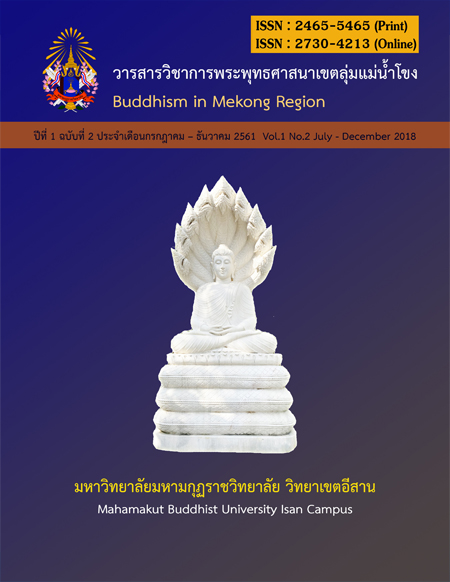Socially Engaged Buddhism in Cambodia: Social Value and welfare
Main Article Content
Abstract
With its vitality in regions around the world, world peace and social harmony begin with the Buddha's teaching in which we train our inner world and our outer world for positive peace. By positive peace, we mean addressing the underlying root-causes of human suffering and conflict. It was during the tumultuous times in Cambodia when the Venerable Maha Ghosananda (1927 -2007) encouraged the Sangha (Buddhist monkhood) to find the courage to "leave [their] temples (pagoda, wat) and enter the temples of human experience, temples that are filled with human suffering." Maha Ghasananda was referencing the need to preserve an over 2560-year-old Buddhist tradition of investing in humanity in order to develop a peaceful and harmonious world.
As such, the term "Socially Engaged Buddhism" refers to the active involvement of Buddhist monks in society in order to reverse the scourge of direct, structural and cultural violence in society. It urges Buddhist leaders to strengthen their ongoing noble missions to cultivate mindfulness and promote a path of non-violence, equanimity and sustainable social development programs as a valued and morally correct roadmap to positive peace.
With its increasing vitality in regions around the world, Buddhism and the Four NobleTruths and Eightfold Path offer valuable relief and guidance at a time when peace and social harmony seems to be a deferred dream for the marginalized and rejected segments of society. As Buddhism and the Sangha recover from near expungement, socially engaged Buddhist in Cambodia are heeding to Maha Ghosananda's advice to find the courage to enter the temples of human experience and suffering. This has been best illustrated in the creation of various Theravada Buddhist-led peace building organizations, most notably Buddhism for Education of Cambodia (BEC).
Therefore, by promoting the morally and ethically right use of the Four Noble Truths and Eightfold Path in post-conflict Cambodia, BEC is recognized as a valuable carrier of positive peace through its five peace building programs: Youth Education, Prisoner Education, Media Dharma Talks, Children Sponsorship, and Caring for the Poor and Aging. It is through socially engaged Buddhism where non-governmental peace building organizations like Buddhism for Education of Cambodia aim to address the underlying root-cause of direct, structural and cultural violence.
Article Details
- ผลงานที่ส่งตีพิมพ์จะต้องไม่เคยเผยแพร่ในสิ่งตีพิมพ์อื่นใดมาก่อนและต้องไม่อยู่ในระหว่างการพิจารณาของวารสารอื่น การละเมิดลิขสิทธิ์ถือเป็นความรับผิดชอบของผู้ส่งบทความโดยตรง
- ต้นฉบับที่ส่งตีพิมพ์ต้องเป็นภาษาไทยหรือภาษาอังกฤษเท่านั้น
- ต้นฉบับต้องผ่านการกลั่นกรองโดยผู้ทรงคุณวุฒิและได้รับความเห็นชอบจากกองบรรณาธิการ
- ในกรณีที่เป็นบทความแปล ต้องได้รับอนุญาตจากเจ้าของลิขสิทธิ์ โดยการขออนุญาตให้เป็นไปตามหลักจริยธรรมสากล
- ข้อความ เนื้อหา รูปภาพ และตาราง ที่ตีพิมพ์ในวารสาร เป็นความรับผิดชอบของผู้เขียนบทความแต่เพียงผู้เดียว มิใช่ความคิดเห็นและความรับผิดชอบของกองบรรณาธิการวารสาร กองจัดการ และมหาวิทยาลัยมหามกุฏราชวิทยาลัย วิทยาเขตอีสาน
6. ผลงานที่ได้รับการตีพิมพ์ถือเป็นลิขสิทธิ์ของวารสาร
References
Bond, George D. (2004). Buddhism at Work: Community Development, Social Empowerment and the Sarvodaya Movement. Bloomfield, CT: Kumarian Press
Campbell, Susanna, Chandler, David and Sabaratnam, Meera. (2001). A Liberal Peace? TheProblem and Practices of Peace building. New York: Zed Books.
Chandler, David. (2008). A History of Cambodia. Philadelphia, PA: Westview Press.
Chandler. Dawn and Torbert, Bill. (2003). "Transforming inquiry and action interweaving 27 flavors of action research." Action Research, 1, 133-152.
Chappell, David W. (1999). Buddhist Peace work: Creating Cultures of Peace, ed. Boston, 44 MA:Wisdom Publications.
Colletta, Nat J and Cullen, Michelle L. (2000). Violent Conflict and the Transformation of Social Capital: Lessons from Cambodia, Rwanda, Guatemala, and Somalia. Washington, DC: The World Bank.
Dalai Lama, Marcy, Joanna, ThichNhatHanh, Snyder, Gary, Maha Ghosananda, Aitken,
Robert, Spretnak, Charles and others. (1998). ed. Fred Eppsteiner. The Path of Compassion: Writings on Socially Engaged Buddhism. Berkeley, CA: Parallax Press.
Eppsteiner, Fred. (1988). The Path of Compassion: Writings on Socially Engaged Buddhism. Berkeley, CA: Parallax Press.
Harris, Ian. (2005).Cambodian Buddhism: History and Practice. Honolulu, Hawaii: University of Hawaii Press.


